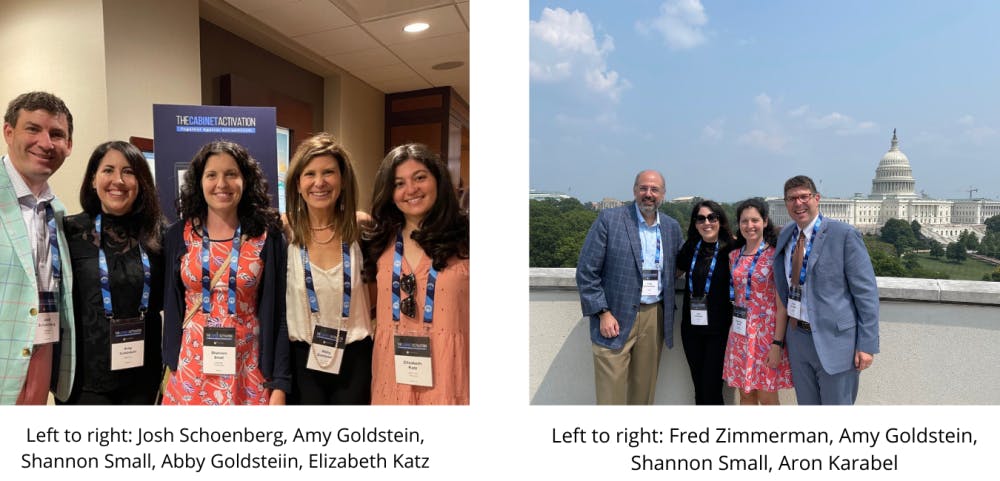
Earlier in the summer, two big questions remained. Would President Biden nominate a Special Envoy to Monitor and Combat Antisemitism? Would the Jewish Federations of North America receive their requested funds from the Nonprofit Security Grants program? By the time of the DC event, the President had nominated esteemed historian Professor Deborah Lipstadt as his Special Envoy, a moved hailed by many as the right choice to de-politicize antisemitism and to push governments to take the threats seriously. And in August, Eric Fingerhut, President and CEO of the Jewish Federations of North America, testified before the U.S. Senate Committee on Homeland Security and Governmental Affairs seeking increased funding in 2022, his goal set at $360 million. At the NYLC activation event in DC, Cabinet members heard not only from Fingerhut, but from nearly a dozen current and former members of Congress, all calling for the increase in security funding to help Jewish communities around the country combat antisemitism.
In addition to elected leaders, there were speakers from the nonprofit world and other lay leaders. Fred Zimmerman is a former Chair of the NYLC and attended the DC activation. He says the bonds created through these types of events are a big part of what it takes to make real change. “People who are on Cabinet are all motivated by the same thing: to do something meaningful and to make a difference for Jewish communities,” he says, “These are people who are informed and connected and can go out and make the case for whatever is important to Jews.” And for new members, like Amy Goldstein, it was critical to be present to hear firsthand from the various speakers and then be able to interact with other likeminded people. “The Cabinet activation event, the first in-person Cabinet experience offered since I joined the group in 2020, was well worth attending. The speakers were excellent and getting to know other Cabinet members from across North America was personally meaningful. I attended with the intention of listening and learning.”
Combatting antisemitism is no small task and it has topped the agenda of the organized Jewish world for generations. An online rally in May brought together over 30,000 people to push congress to address the pressing needs for security. Elana Broitman, Senior Vice President of Public Affairs for JFNA, says, “It really hearkened back to rallies for Soviet Jewry in the 1970s and helped show that antisemitism is not just one thing.” She says thanks to social media there is an alarming amount of activity right now. “The spike in number and the quantitative amplification of those messages is startling and troubling.” Broitman says the most effective place to start to push back is at the local level. “Nothing works nationally, it has to be local. That’s where we see deep relationships with elected leaders, other partner groups and on college campuses.” She also says it is at the state level where future national leaders get their start and carry their local connections with them. And when that next generation of leaders arrives in Washington, Nashville’s young leaders will be ready. “Nashville is as critical as any other city,” says Broitman, “It is bringing tools, developing government advocacy and allies that ensure the younger generation is prepared for what they might face.”
The next step in furthering this year’s NYLC agenda is the creation of a committee to keep the focus on security and the pressure on the fight against antisemitic activity. Karabel says, “It’s time to have the hard conversations about what we are dealing with and how we address it.” It is notable that 300 current and former Cabinet members traveled to Washington DC for the activation event with little notice. Seasoned advocates and lay leaders say it is that dedication that is driving the cause. Zimmerman says, “We can’t change minds wholesale, the solution has to come from within us, our community.” For first-timer Goldstein, she was moved by the story of Julia Jassey, who founded Jewish On Campus, a student run group that helps students fight back against antisemitism on college campuses. She says, “I have a great deal of respect for Julia for standing up for herself and others, when it is much easier to stay silent. I want to continue learning so I can communicate more effectively about antisemitism and ultimately support people like Julia and individuals in our amazing Nashville Jewish community who are experiencing similar challenges.”
The Jewish Observer is published by The Jewish Federation of Greater Nashville and made possible by funds raised in the Jewish Federation Annual Campaign. Become a supporter today.

